TOUWS RIVER’S TORMENT
Drowning in hunger and despair – food insecurity in a small Western Cape railway town
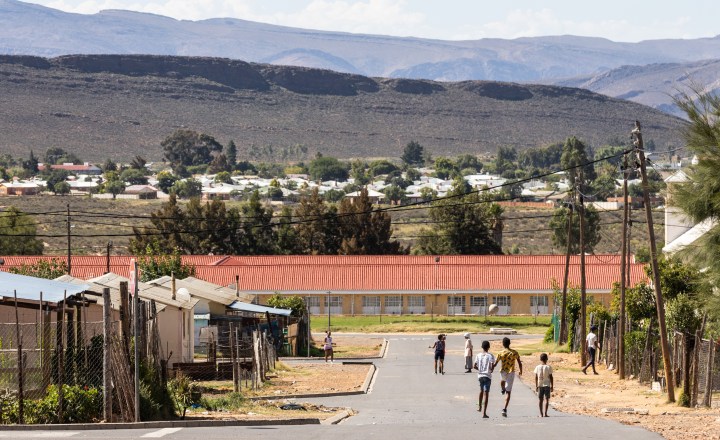
The burden of hunger in Touws River is heavy, as a recent ‘learning journey’ revealed. Understanding how the local food systems work is crucial to stemming further socioeconomic breakdown in this and other small rural towns.
Touws River, where the Boland gives way to the Karoo, is in distress.
The town, situated about 160km northeast of Cape Town, lies adjacent to the N1, the national route linking this capital to the interior. It straddles a railway line and marks the point where the Donkies River flows into the Touws River.
Although it’s in a relatively dry part of the Western Cape, the town remains at risk of severe flooding during periods of heavy rain.
It’s a different kind of risk, however, that’s becoming of increasing concern.
“Our people are drowning in hunger and despair,” says Rashaad Baker of Compassionate Hearts. This NGO, which runs a soup kitchen from a spaza shop inside Baker’s home, feeds up to 1,000 people a day.
Most of the town’s 8,130 inhabitants are living under the breadline.
An estimated eight out of 10 people living here do not earn an income, adrift on the harsh plains of unemployment in rural South Africa.
As a result, many households have become dependent on social welfare grants (especially child support grants) and food aid.
A town left hungry
Recently, about 60 decision-makers, academics, government officials and representatives of NGOs involved in the local food system undertook a “learning journey” in Touws River.
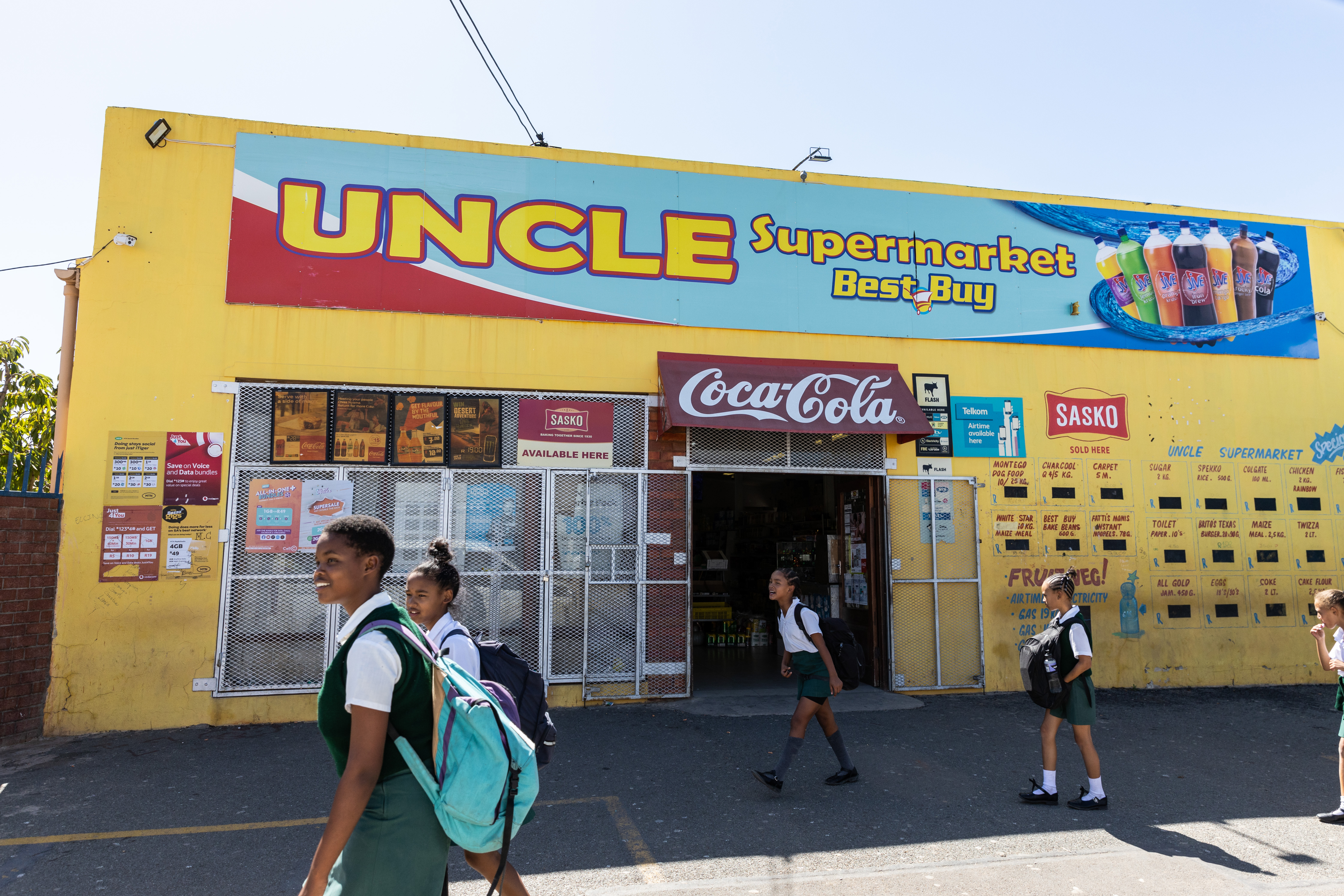
Understanding how people get food, how they use it and how to ensure that there is always sufficient, nutritious food available are at the heart of efforts to improve food security in at-risk households. (Photo: Ashraf Hendricks)
At the time of our visit, people were queueing outside the Compassionate Hearts soup kitchen, empty handed except for old ice cream and polystyrene containers.
With winter fast approaching, seasonal agricultural work on farms in the nearby De Doorns area has all but dried up.
This common source of employment for the people of Touws River is only available in the fruiting season, from November to March. During the months in between, many are left jobless, making food security a very real concern.
Based in Topkamp, an old part of town featuring railway housing, the soup kitchen is a haven for the hungry.
Men in faded shirts and blue worker overalls drift into the queue. Many avoid making eye contact, their shoulders slumped, burdened with an unquantifiable weight.
Grannies armed with plastic chairs gather underneath the eucalyptus trees on the corner of Populier Avenue, opposite the D.C. Spaza Shop from which the kitchen operates. They are ready for the long wait.
Many are there to receive their only meal of the day. If they’re lucky, second helpings will be available to take home for later.
Baker opens the lid of one of the 100-litre pots, revealing the steaming dish that has been simmering since tea time.
Two volunteers who have been prepping since 7am dish out heaps of rice and a fragrant stew.
Those in the queue give thanks by reciting the Lord’s Prayer.
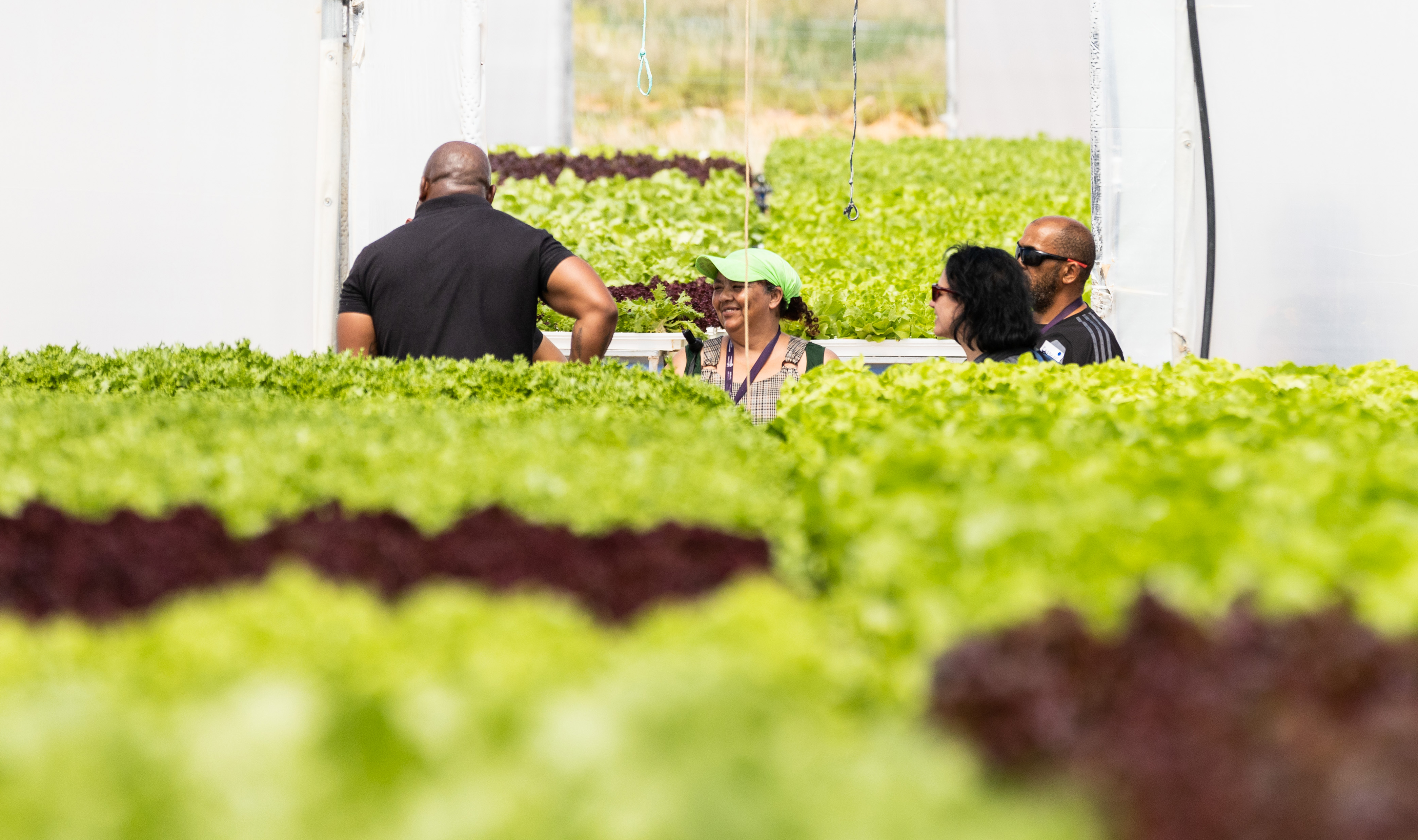
Hydroponic farming involves growing plants in water, without soil but with the necessary nutrients and oxygen. Here visitors are taken on a tour inside one of the greenhouse tunnels at the Touwsrivier Commercial Hydroponics Farm. (Photo: Ashraf Hendricks)
The burden of hunger
Since the start of the Covid-19 pandemic, Baker and volunteers at Compassionate Hearts have been providing food relief in this part of town. The protocols and red tape involved in securing government support having proven too difficult to navigate, they rely solely on the help of individual sponsors and NGOs such as Gift of the Givers.
“We started out feeding about 20 hungry kids,” Baker recalls. “Since then, the queues have not dried up.”
Despite the town being situated near a productive farm area producing high-value crops, food availability in the region does not translate into access to sufficient, healthy food for those at risk of food insecurity.
People are falling into a cycle of debt with money lenders. They buy food on debt from food brokers. Even worse, some swap the few potatoes they have for liquor.
Since the pandemic, many diffused actions and scattered efforts have been made to improve food security in the town. NGOs, local churches and individuals have helped with charitable food distribution. Still, many households fall through the cracks.
Most of the town’s 2,000 households are considered “food insecure”, meaning socioeconomic conditions limit their access to safe, nutritious food – and sufficient amounts of it.
“Many of our people are suffering and hungry,” Baker says. “Our town is experiencing a crisis.”
Growing up hungry
People are often ashamed to talk about their hunger, says Johanna Solomon, principal of the Emmanuel Educare down the street from the soup kitchen.
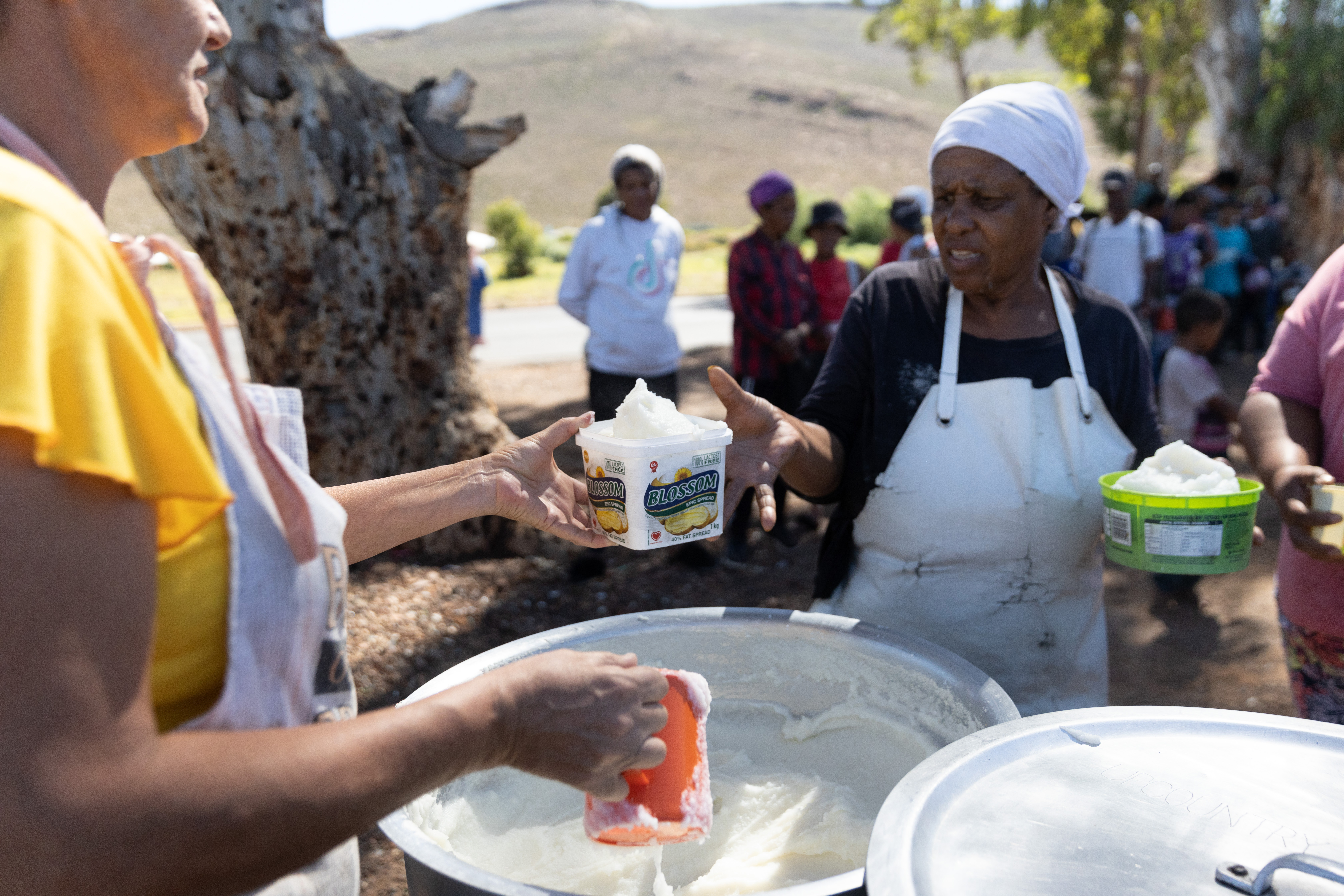
Local households are being shunted to an increasingly insecure future, given the unabated rise in food prices and increasingly limited job opportunities. (Photo: Ashraf Hendricks)
Solomon and her team provide care to 60 children under the age of five years at this early childhood development centre. They receive a monthly state subsidy of R4,500 for 32 of these children, despite having twice applied for an increase in grant support. Unfortunately, this means she has to dig into her own pocket to cover food and other expenses such as electricity. She often also buys extra rice or pap and slips a packet of food into the backpack of those kids whose families are struggling the most.
“The town is in a donga,” Solomon says. “People are falling into a cycle of debt with money lenders. They buy food on debt from food brokers. Even worse, some swap the few potatoes they have for liquor. Our children are eventually the ones who suffer the most.”
Solomon’s concerns are validated by the statistics. Among children of five years and younger, Touws River has an extremely high level of malnutrition. Children in this age group are sometimes seen by the local clinic – occasionally even admitted to hospital – for severe undernutrition.
Moreover, the group displays a stunting rate of 26%. Stunting affects a child’s physical and brain development, as well as developmental trajectory. Clearly, the cost of children not receiving adequate food nor proper nutrition is high.
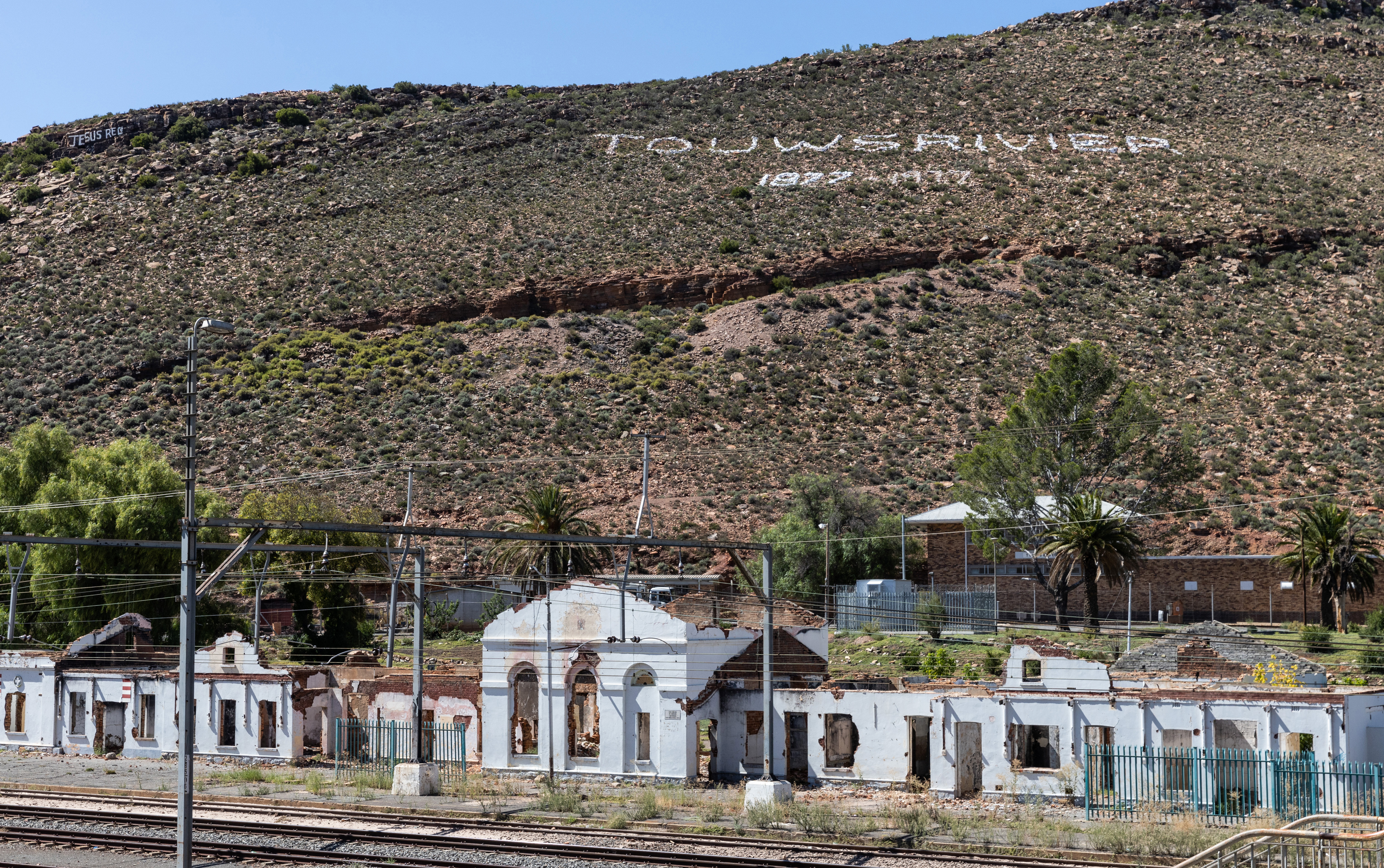
The railway station, once central to the town’s economy, has been left derelict and vandalised. Touws River and its people have experienced a general economic decline that collapses all the more with the further decapitalising of the country’s railway system and the changeover to road freight. (Photo: Ashraf Hendricks)
“We have many children in our care who are underfed or eating only unhealthy food like chips and sweets. As a result, they grow more slowly than the rest, often fall behind in class, and are slow learners,” Solomon says.
Moreover, some children in their care are also affected by foetal alcohol syndrome, caused by mothers drinking during pregnancy. “These kids also have learning difficulties, take longer to grow and to learn to speak.”
Wasting away on the municipal periphery
Touws River, today a shadow of its heyday self when it bustled with activity, once played a crucial role in the railway sector.
The closure of Spoornet’s railway yards in the 1980s resulted in extensive unemployment and economic stagnation. The broader (national) politics around state-owned enterprises and Transnet in particular has also frayed the social fabric of life in Touws River.
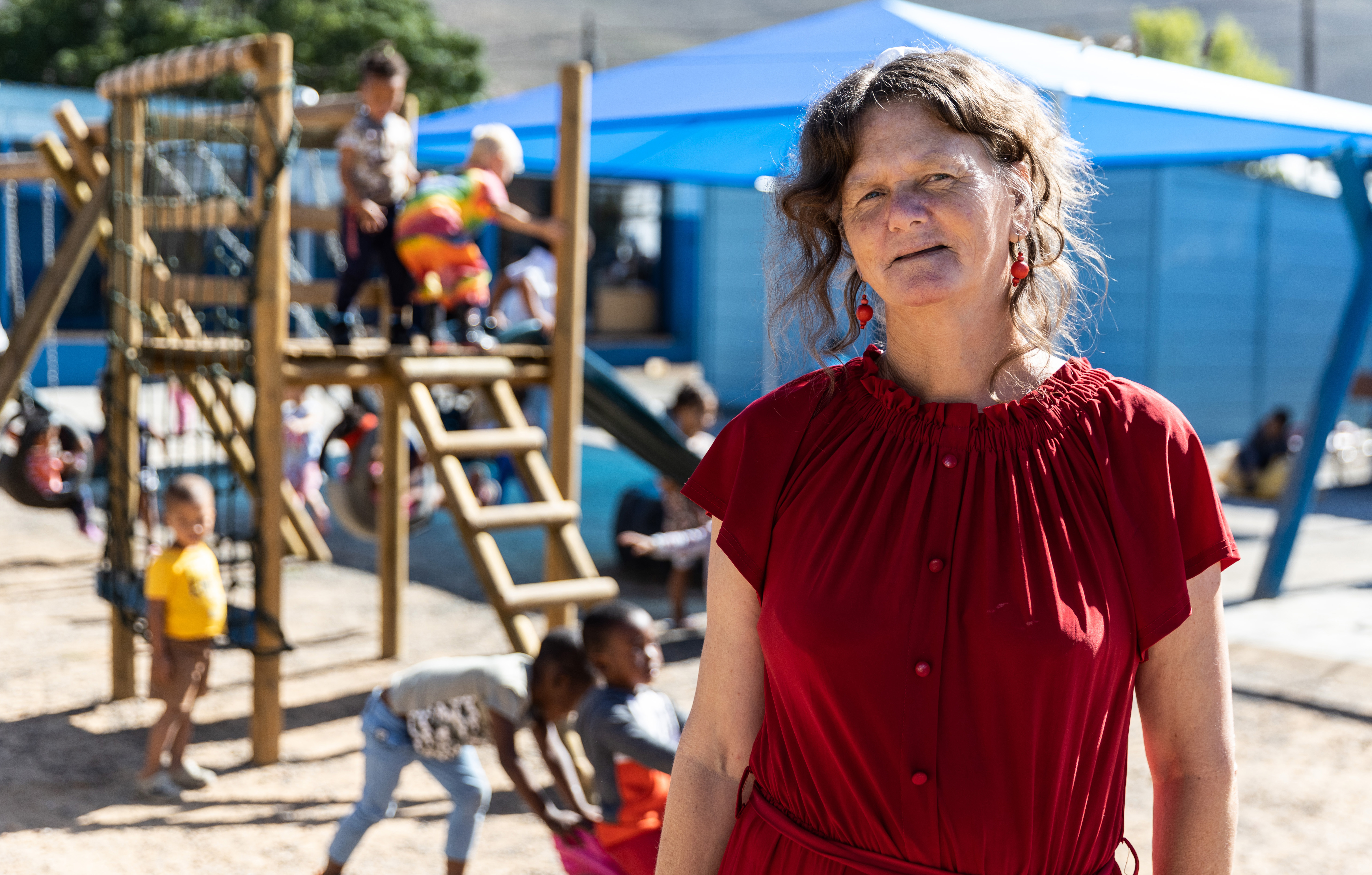
Johanna Solomon, who runs the Emmanuel Educare, says more efforts should be invested in providing proper nutrition for the town’s children. ‘Supporting the existing school feeding schemes at the town’s schools and crèches can go a long way to improve our children’s health and prospects,’ she says. All three schools in town are no-fee schools and have active school feeding programmes. (Photo: Ashraf Hendricks)
The town’s multitude of socioeconomic problems and risks are further compounded by the exodus of private businesses, which has left many essential services unavailable.
Read more in Daily Maverick: Budget comparison confirms Cape Town delivers the most for the poor while offering ratepayers value for money
Many residents say Touws River is the “orphan” of the Breede Valley Municipality when it comes to the allocation of resources and services.
Like many other small towns, Touws River lies far from the urban centre where most economic and maintenance efforts are focused.
“If people need a doctor or have to apply for an ID, they have to travel to Worcester,” Solomons explains. “If you don’t have a lift or a vehicle, you have to take a taxi. The return trip costs R100.
“The taxi leaves at nine o’clock and returns at two. If you’re not helped by then, or there’s load shedding, you’ll have to return the next day. ”
There is no bank in town and the ATMs seldom have enough cash. While there is a local clinic, a police station and two libraries, the closest Department of Home Affairs office is 75km away in Worcester. There is also no local ambulance service or fire station. The nearest is 40km away in De Doorns, disabling a rapid response time.
Locals reckon the town has no real voice in the municipality, being but one of its 21 wards.

Many of the town’s children under five are malnourished, while many adults are forced to subsist on nutritionally poor diets, which results in poor health outcomes. As a result, conditions like diabetes, high blood pressure and obesity are also rising. (Photo: Ashraf Hendricks)
This situation, together with rising hunger, is escalating the levels of frustration and despair among residents.
In an act of rebellion, an unknown author has graffitied the sentiment of a town onto a zinc fence next to the municipal office: “C19 + Honger = Dood. Ons is honger. BVM maak ’n plan.” (“Covid-19 plus hunger equals death. We are hungry. Breede Valley Municipality, make a plan”).
Getting to grips with the town’s plight
During the recent “learning journey”, roleplayers held discussions with Touws River’s people to understand the factors affecting the local food system and to explore potential solutions.
The contingent visited soup kitchens, a primary school, an urban garden, crèches, a local food producer and a hydroponic farm just outside town.
In these places they explored how food and climate systems intersect with land-use patterns, how decisions about food are made, and how the types of food consumed affect people’s health.
The experience included immersions into different aspects of the food system, hosted by locals from Touws River.
The two-day learning process was convened by the Western Cape Economic Development Partnership (EDP), the Southern Africa Food Lab and the DST-NRF Centre of Excellence in Food Security.
The programme involved in-depth discussions, workshops and follow-up discussions with officials in all three tiers of government.
The aim was to have participants experience different aspects and people’s lived experiences of this food system through observations and conversations, says Professor Julian May, director of the Centre of Excellence in Food Security. May and his team are conducting ongoing research into food security in the region.
Covid-19 has amplified food insecurity, revealing more of the structural problems within the food system, says Professor Scott Drimie, director of the Southern Africa Food Lab. Drimie, a political economist working on food systems, is based at Stellenbosch University’s Faculty of Global Health.
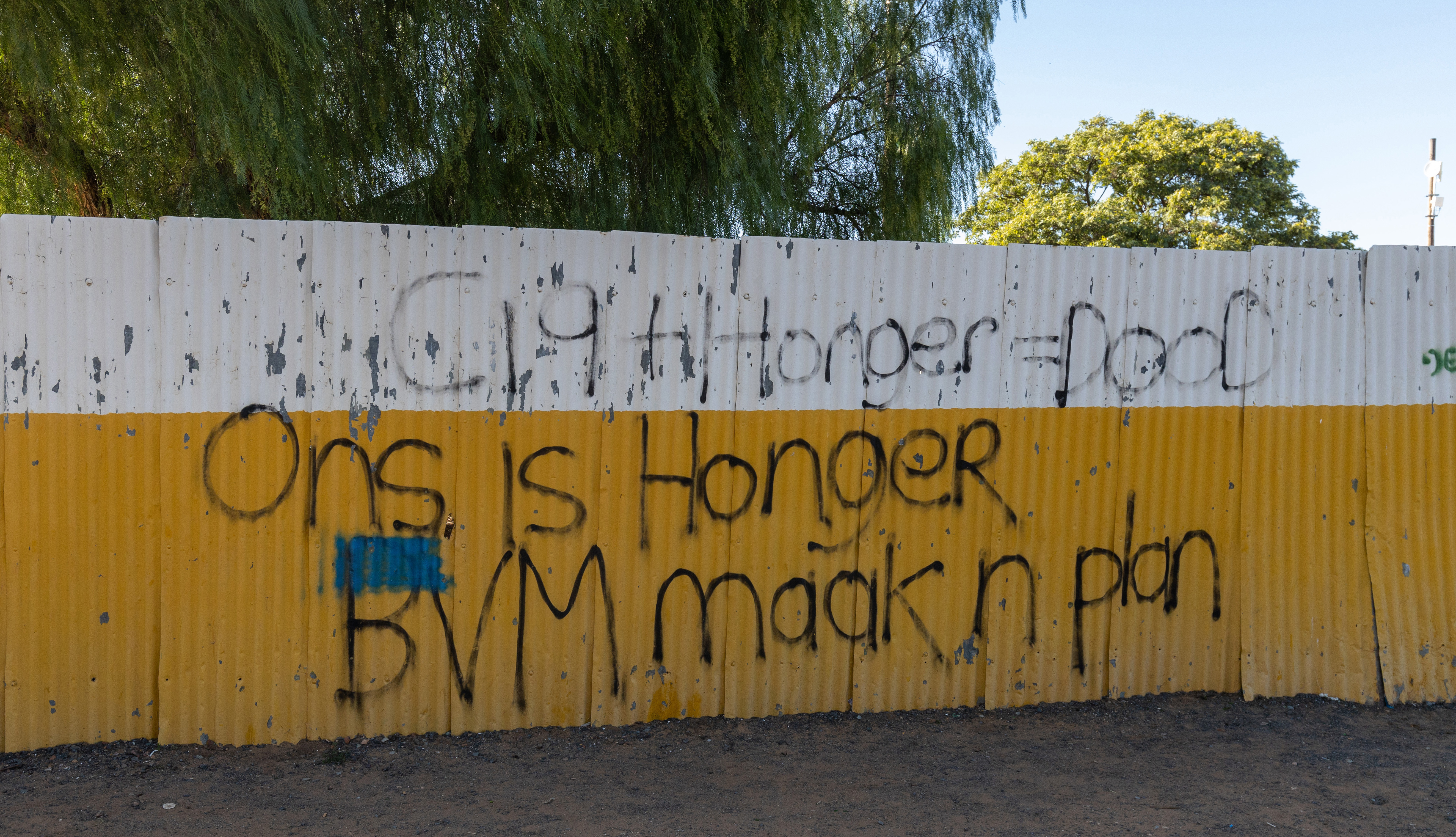
Locals reckon the town has no real voice in the municipality. This situation, together with rising hunger, is escalating the levels of frustration among residents, as graffiti painted onto a zinc fence next to the municipal office illustrates: ‘C19 + Honger = Dood. Ons is honger. BVM maak ’n plan’ (‘COVID-19 plus hunger equal death. We are hungry. Breede Valley Municipality, make a plan’). (Photo: Ashraf Hendricks)
As part of efforts to tackle the impacts of food insecurity in the province, the Western Cape government launched the “Nourish to Flourish” strategy in 2017. Ongoing work resulting from the recent learning journey in Touws River builds on efforts already under way in support of this strategy.
Like May, Drimie believes that other rural towns can benefit from the lessons being learnt as a result of this particular learning journey. Touws River offers a reminder that food systems in the Western Cape include those in small towns on the periphery of urban centres that are likely to be forgotten despite the need for food security.
Learning from lived experiences
The Touws River learning journey was the fifth in the Worcester region since 2021. Some of these exchanges, including journeys into Worcester’s Zwelethemba and Durban Road, focused on the role of early childhood development centres and street vendors in ensuring food security.
A learning journey differs from a study tour or a visit by officials. “It creates a collaborative space in which local actors involved in food systems can exchange ideas and possible solutions,” Drimie explains. “This is designed to deepen participants’ understanding of the local food system so they may generate better ideas for its reshaping.”
No one goes home empty handed, even if it means giving them just bread with peanut butter.
May says: “We look at how food systems function, what the outcomes of these systems are, and how these will change over time, especially in the face of climate change. To do this, we follow a place-based approach by focusing on a specific community. This approach enables us to develop insights into some of the factors that affect food security in the area.”
This learning journey has also firmly put the spotlight on how service delivery and infrastructure factors in the town affect food security at a household and community level, he says. Plans are under way to host a similar learning journey in De Doorns.
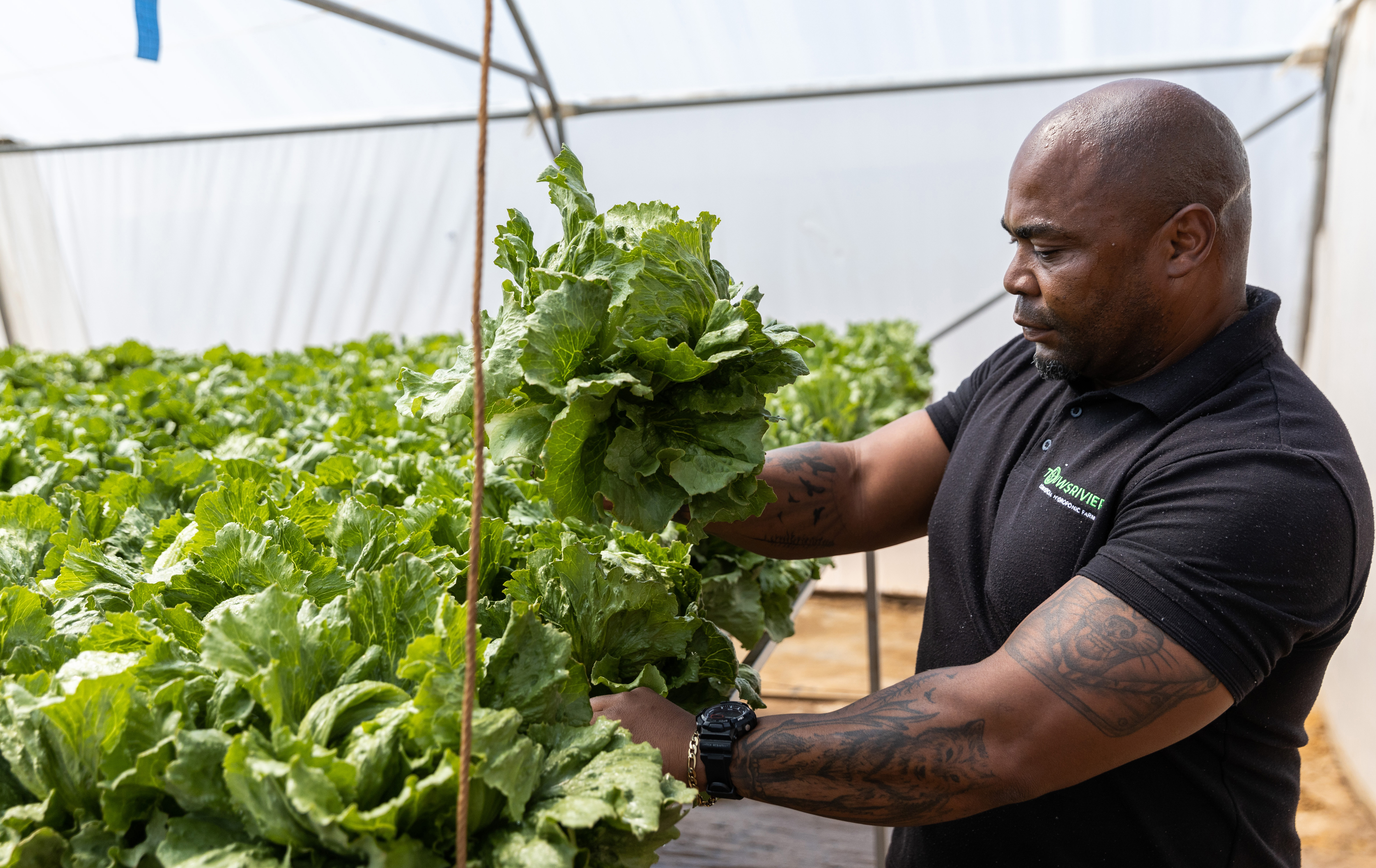
Rudie Moses, the manager at the Touwsrivier Commercial Hydroponics Farm, at work. This hydroponic farm relies on state-of-the-art water management systems and greenhouse infrastructure. Hydroponic farming involves growing plants in water, without soil but with the necessary nutrients and oxygen. (Photo: Ashraf Hendricks)
A changing climate
The global climate is another factor affecting food security in the region. In the context of climate change, drought has been identified as a key driver of vulnerability for agriculture. As a result, it is considered a priority area for adaptation in this part of the province.
Science provides strong evidence that the climate is shifting and will continue to do so into the future, says Dr Stephanie Midgley, an expert scientist responsible for climate change and risk assessment in the Western Cape department of agriculture.
Read more in Daily Maverick: On the streets of a Karoo town – where drugs, drink and poverty await a lost generation
Evidence suggests that the impacts of climate change, including hotter conditions, changes in rainfall patterns and more extreme weather events, will affect agricultural production. In turn, these changes will affect the quantity, quality and price of available food.
This will ultimately threaten jobs in the farming sector and will require appropriate coping measures and adaptation responses to reduce climate-related risks.

The NGO Compassionate Hearts runs a soup kitchen from inside this home in the Topkamp section of town. (Photo: Ashraf Hendricks)
The region’s vulnerability to climate change has been proven by the effects of the recent multiyear drought (2015 to 2017), which persisted in the semi-arid Touws River region long after its back was broken elsewhere in the province. Studies show that the likelihood of this drought was increased by anthropogenic climate change, and that this trend is expected to continue.
Growing new prospects
New avenues are needed to put Touws River and its people on a path to a more secure future, including new investments in the town that can help create more and sustainable job opportunities.
One such initiative is the privately owned Touwsrivier Commercial Hydroponics Farm (TCHF), intended to provide sustainable employment in the local community. The farm is owned by Knowledge Pele and the Touwsrivier Solar Community Trust.
Rudie Moses, the manager at TCHF, is also a member of the development facility established by the nearby CPV1 solar plant. Fewer than 10 people are currently running the (largely mechanised) operations. They tend to six tunnels, which produce 4,000 lettuce heads weekly. Plans are under way to erect more tunnels if funding can be secured.
This kind of green investment does not come cheap. The development of TCHF was made possible by R5-million in grant funding provided by Investec Bank. The business is growing but still needs to secure an offtake agreement with a buyer to reduce its risk.
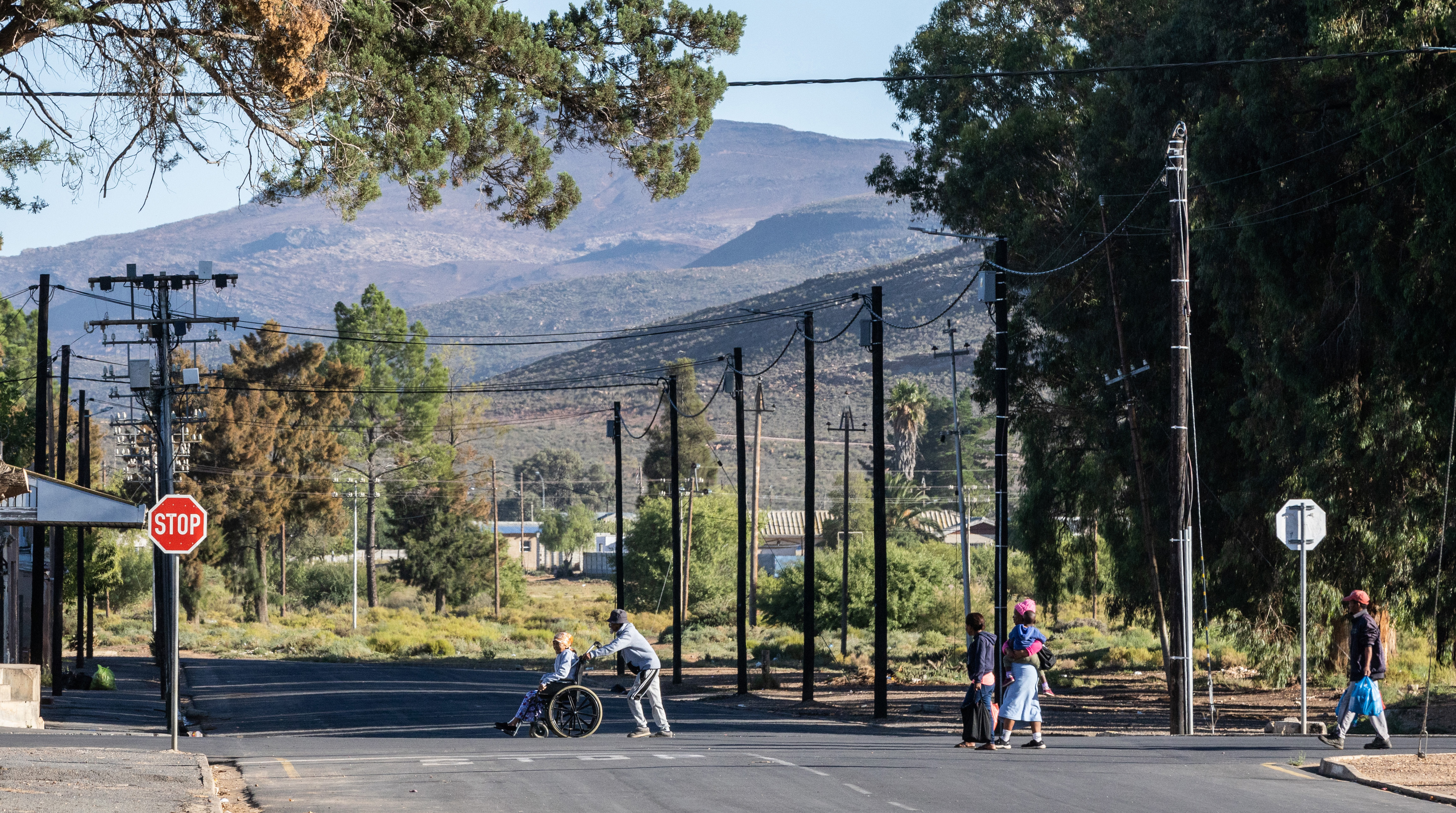
Most of the town’s 8,130 inhabitants are living under the breadline. (Photo: Ashraf Hendricks)
Collaboration to stem hunger
Municipal area manager Neville Fourie hopes this learning journey can help unlock new ways to address some of the town’s complex, interconnected challenges. “Government officials, the private sector and the local community must collaborate to ensure our people have access to sufficient, nutritious food and other resources,” he says.
The issues facing towns like Touws River cannot be solved by actors working on their own, says Nishendra Moodley, EDP’s chief executive. “It’s also not enough to just understand the problem. As the recent learning journey showed, we need the relevant actors to come together to find practical ways to address hunger and malnutrition.”
Read more in Daily Maverick: The desperate lament of Soweto’s poor and fearful elderly
Since the learning journey event, the district director of the Western Cape department of agriculture and his delegation have had a follow-up visit to Compassionate Hearts. It was agreed that a closer working relationship would be forged, with a focus on supporting community and school food gardens to increase access to fresh produce.
In addition, the “Nourish to Flourish” working group, the EDP, the Southern Africa Food Lab and the DST-NRF Centre for Excellence in Food Security have committed to working closely with the relevant provincial, district and local government departments to follow up on some of the issues uncovered during the Touws River learning journey.
Dishing out compassion
Back at the soup kitchen, lunch has been served and the queue slowly disperses.
“Our aim here is simple,” Baker says. “No one goes home empty handed, even if it means giving them just bread with peanut butter.
“Yes, we know this [providing food aid] is not sustainable. But we also cannot stop while our people go hungry. If we don’t step in, who will?” DM/MC




















 Become an Insider
Become an Insider
Sad story and a good example of the Social and Economic Carrying Capacities of a rural community being (far) exceeded. This did not happen overnight. Unfortunately with the school numbers in Touwsriver extracted from the W-Cape Education Dept web site this situation will battle to improve. Numbers as follows:
TOUWSRIVIER PRIMARY SCHOOL = 658 learners
Steenvliet Primary = 640 learners
Touwsriver High School = 636 learners
The only immediate solution is to ‘grow’ the community out of the food insecurity and market gardens, co-op agriculture similar to Kibbutzim plus public works programmes in the broader area. At the same time expansion of the town through population growth must be limited through incentives and family planning education. Oh! – last point, and all unused railways throughout SA should be privatized.
Well said! Education and Birth Control are the best investment we can make to get this country on some sort of even keel and keep our heads above water.
How can I help? Please let me have a contact number
Gift of the Givers is shown to be a trustworthy way of helping.
A very sad story ( and to be found throughout SA today) but the people still vote for the thieves within the ANC and EFF….beggars belief!
This is a truly sad story. I didn’t know that the people were in such a bad way. I will try my best to help in some way.